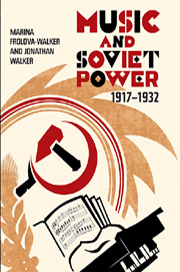Book contents
- Frontmatter
- Contents
- Preface
- Acknowledgements
- Note on transliteration
- Chronology of Political and Musical Events
- October 1917–18: Out of Chaos
- 1919: Depression and Fever
- 1920: Bureaucracy on the Rise
- 1921: Should I stay or should I go?
- 1922: Just Like the Old Days?
- 1923: The Birth of ASM and RAPM
- 1924: ASM in the Ascendant
- 1925: Equilibrium
- 1926: Guests from the West
- 1927: Celebrations
- 1928: At the Crossroads
- 1929: Velikiy perelom – The Great Turning Point
- 1930: RAPM's Glorious Year?
- 1931: RAPM's Fortunes Turning
- 1932: The Rules Change
- Key to Acronyms and Institutional Bodies
- Glossary of Names
- Bibliography
- Index
1931: RAPM's Fortunes Turning
Published online by Cambridge University Press: 05 April 2013
- Frontmatter
- Contents
- Preface
- Acknowledgements
- Note on transliteration
- Chronology of Political and Musical Events
- October 1917–18: Out of Chaos
- 1919: Depression and Fever
- 1920: Bureaucracy on the Rise
- 1921: Should I stay or should I go?
- 1922: Just Like the Old Days?
- 1923: The Birth of ASM and RAPM
- 1924: ASM in the Ascendant
- 1925: Equilibrium
- 1926: Guests from the West
- 1927: Celebrations
- 1928: At the Crossroads
- 1929: Velikiy perelom – The Great Turning Point
- 1930: RAPM's Glorious Year?
- 1931: RAPM's Fortunes Turning
- 1932: The Rules Change
- Key to Acronyms and Institutional Bodies
- Glossary of Names
- Bibliography
- Index
Summary
In the first half of the year, RAPM's domination increased still further, and many of those who had tried to hold out for better times began to succumb. After surviving a purge at the Leningrad Conservatoire, which spared him but resulted in the sacking of his disciple Semyon Ginzburg, Asafyev took a decision:
Without compunction, I resolve simply to deliver myself into the hands of RAPM, to work solely under their control and according to their instructions (if they accept this, of course). There is no other way out, and alone I won't be able to reform myself, but one needs to live, and above all, I place little trust in Leningrad Conservatoire.
Asafyev's capitulation marked the end of Igor Glebov, the ardently modernist critic and cutting-edge theorist. Asafyev reasoned that RAPM's hegemony was the consequence of his own earlier defeat, when his friends and associates rejected his ideas. RAPM then filled the breach. Here, he rehearses the story in a letter to Derzhanovsky that looks back to lost opportunities in 1924:
What would be the point in writing any more? Everything has been poisoned. We can put a brave face on it if we like, but RAPM is right. They are right because they did what had to be done. They are taking flak for writing poor music, for self-promotion, for ignorance, etc. etc. But all these shots miss the target. They miss, because all mistakes are forgiven those who have travelled in the right direction. And they succeeded in taking the right direction at the right time. […]
- Type
- Chapter
- Information
- Music and Soviet Power, 1917–1932 , pp. 284 - 313Publisher: Boydell & BrewerPrint publication year: 2012



